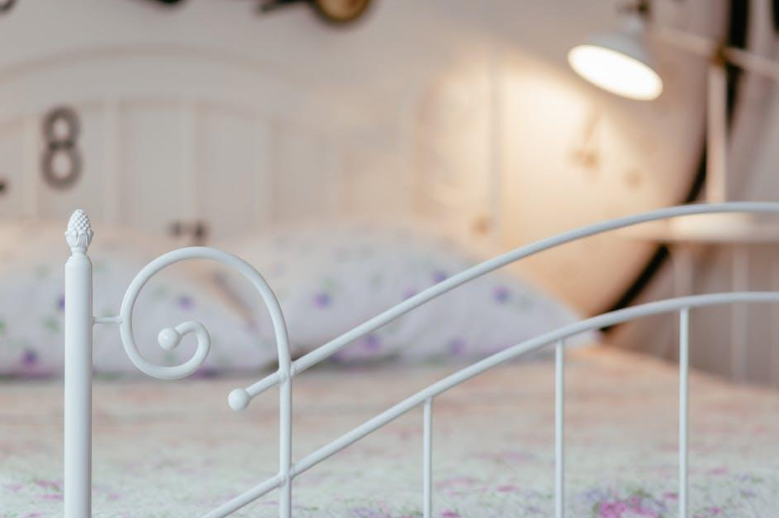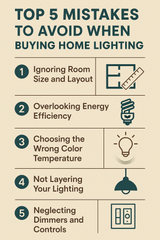Improve Your Sleep by Changing Your Artificial Lighting
Improve Your Sleep by Changing Your Artificial Lighting
Let’s start off by saying how grateful we are that artificial illumination exists. It allows us to continue to work and play during the darker hours, to stay outdoors for an extended period of time, and to provide extra security outside our home or business.
But there comes a point where there is such a thing as too much illumination. Artificial light is clearly not a natural source of illumination, but just like natural light, artificial light has the power to trick our circadian rhythm into thinking it’s still daytime, and in turn, it seeks to provide us more energy to get through the rest of the “day.”
Some more than others are affected by artificial illumination when using it for extended periods of time. But fortunately, there are ways to combat the negative effects of illumination so that your circadian rhythm, and thus sleep, mood, energy level, and overall mental health, are not negatively impacted.
Your solution isn’t to cut back on artificial illumination or have less lighting in your home overall. Instead, our Cocoweb team advises you to do something incredibly simple: change your lightbulb or your illumination habits – if not both.
Here’s what you can do specifically:
1. Opt for a bulb that emits less blue light and use a blue light filter for your electronics.
Did you know that blue light affects your melatonin production twice as much as other wavelengths? It’s absolutely true. However, it’s pretty much a given that you have blue light in your home.
Interestingly enough, Khloe Kardashian explained that using a red light bulb significantly helped her feel more alert as a new mother as it improved both her and her newborn’s sleep. The science behind using red bulbs to improve sleep is true in that it is the light wavelength less likely to affect our hormone levels.
According to the Kardashian star:
"A red light has a much higher wavelength and doesn't inhibit the body's secretion of melatonin, the hormone that helps you sleep. So right after [my baby is] done eating, she easily goes right back to sleep for the night."
Some may consider going out and buying a red bulb – or anything other than blue or white light – but Khloe has another wise idea in mind: purchase the Lucero Smart Light Bulb. This bulb can change any color you want, and you can change its hues in just a split second using its associated smart phone app. It’s also equipped with a built-in timer! It’s incredibly diverse.
But there is still another issue: Our electronic devices alone emit blue light – our laptops, computers, tablets, phones, you name it. But consider these solutions:
- At night, use your devices at a lower brightness level. (You may have already noticed that you can have your screen on full blast during the day but may have to turn it down at night.)
- Use the blue light mode or nighttime mode on your devices. Many devices are already equipped with this. This will make your screen a warmer hue that not only is less damaging to your circadian rhythm but is also less harsh on the eyes overall. Most devices will allow you to make your screen as warm as you prefer.
- Use your devices for shorter periods of time at night.
- Purchase a blue light filter for your devices’ screens, or wear blue light filter sunglasses while using your electronics at night. (You can find different product options on Amazon.)
2. Get off electronics at least a half hour before bed.
Coming back to the idea that using your electronics, which emit blue light, can be of harm to your body’s natural circadian rhythm especially at night, it is strongly recommended that if and when you do use your devices (especially without a blue light mode or filter) to get off your devices at least a half hour before bed.
Others say that it is better to not use your devices past a certain time period (e.g., 10 p.m.). However, regardless of when you go to sleep, getting off any device – your smartphone included – is best within a half hour if not an hour or two before you hit the hay. And yes, just one time of using a blue light-emitting electronic device before you go to bed can have an impact on your sleep that very night.
3. Consider Dimmable Lighting.
While dimmable lighting is still illumination, it doesn’t negatively impact sleep the way bright lighting can. This isn’t a “cure” for guaranteed better sleep. Rather, it is a variation of artificial lighting you should turn to if you wish to potentially receive better sleep.
Have you noticed that when you have dimmable lighting in your home, you tend to feel more relaxed, sleepier, calmer, and less uptight than when you use very bright lighting? Then you already know the benefits of having lighting with the capability to dim on command.
Dimmable lighting can also improve sleep in the sense that it can reduce headaches and eye strain (which can be caused or exacerbated by brighter forms of illumination) – and we all know that when you have a headache or are suffering from moderate eye strain, it can be more difficult to get a good night’s rest.
4. Sleep with the lights off.
As if it’s not already bad enough that many stay on their phone or computer hours into the night – especially right before bed – there are some people who prefer to sleep with the lights on. This can be for different reasons: for better security, because they are afraid of the dark, force of habit, because they fall asleep unintentionally often, and so on.
However, Harvard research has shown that there may be a correlation between long-term light exposure at night and the risks of different cancers, diabetes, obesity, and heart disease. Interestingly, blind women have a reduced chance of developing breast cancer than their non-blind counterparts, which may tell us that excessive light exposure, especially during night, could correlate with an increase in cancer risks.
Some may think the next best solution is to opt for dimmable lighting or a nightlight for when one sleeps. While this is safer than sleeping with full-blown ambient lighting, do keep in mind that it still can affect the circadian rhythm.
You may notice that the brighter your room is when you go to sleep, the more often you wake up in the night. Artificial (and natural) lighting can disturb your sleep, and in turn, affect your overall restfulness the next morning.
Conclusion
There are many ways that you can improve your sleep just by changing your bulb or eliminating certain habits from replacing your bulbs with ones that emit less blue light or are dimmable to getting off your electronic devices prior to getting some sleep.
In fact, Cocoweb.com has a lovely selection of dimmable light fixtures from barn lights to floor lamps that are said to be safer on the eyes than non-dimmable options.
While a change in lighting is not certain to cure or even reduce insomnia or other sleeping difficulties, it has the potential to help. After all, we live in a modern world filled with artificial lighting; it’s virtually everywhere we go.
Recent Posts
-
Top 5 Mistakes to Avoid When Buying Home Lighting
Lighting plays a crucial role in shaping the ambiance, functionality, and aesthetic appeal of your h …26th Jun 2025 -
Why Lighting Is the Most Underrated Design Element in a Room
Walk into a well-designed space, and you might first notice the color of the walls, the statement fu …13th May 2025 -
How to Choose the Perfect Painting for Your Home or Office
When it comes to decorating your space, choosing the perfect painting can be a game-changer. A well- …7th Feb 2025




